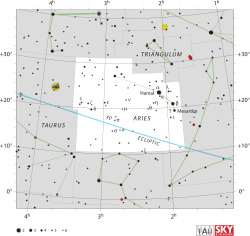|
تضامنًا مع حق الشعب الفلسطيني |
الشرطان (نجم)
اذهب إلى التنقل
اذهب إلى البحث
| الشرطان | |
|---|---|
مكان نجم الشرطان (β)
| |
| معلومات الرصد حقبة J2000 اعتدالان J2000 |
|
| كوكبة | الحمل |
| مطلع مستقيم | 01س 54د 38.41099ث[1] |
| الميل | ° +20 ′48 ″28.9133[1] |
| القدر الظاهري (V) | 2.655[2] |
| الخصائص | |
| نوع الطيف | A5 V[3] |
| U−B مؤشر اللون | +0.170[2] |
| B−V مؤشر اللون | +0.142[2] |
| القياسات الفلكية | |
| السرعة الشعاعية (Rv) | -1.9[4] كم/ث |
| الحركة الخاصة (μ) | +98.74[1]-110.41[1] |
| التزيح (π) | 54.74 ± 0.75 د.ق |
| البعد | 59٫6 ± 0٫8 س.ض (18٫3 ± 0٫3 ف.ف) |
| القدر المطلق (MV) | 1.55 ± 0.09[5] |
| المدار | |
| مرافق | Beta Arietis B |
| الشذوذ المداري (e) | 0.903 ± 0.012 |
| زاوية الميلان (i) | 44.7 ± 1.3° |
| زاوية العقدة المدارية (Ω) | 79.1 ± 0.8° |
| البعد الزاوي الحضيضي (ω) (ثانوي) |
209.1 ± 1.2° |
| تفاصيل | |
| A | |
| كتلة | 2.34 ± 0.10[6] ك☉ |
| ضياء | 23[6] ض☉ |
| جاذبية سطحية (log g) | 4.0[7] سم.غ.ثا |
| درجة الحرارة | 9,000[7] ك |
| معدنية (فلك) [Fe/H] | 0.16[7] dex |
| سرعة الدوران (v sin i) | 73[8] كم/ثا |
| عمر | 0.3[9] ج.سنة |
| B | |
| كتلة | 1.34 ± 0.07[6] ك☉ |
| ضياء | 1.3[6] ض☉ |
| تسميات اخرى | |
| Sheratan, Sharatan, Al Sharatain,[10] 6 Arietis, Gl 80, HR 553, BD +20°306, HD 11636, SAO 75012, FK5 66, هيباركوس 8903.[11] | |
| قاعدة بيانات المراجع | |
| سيمباد | بيانات |
| ARICNS | بيانات |
| تعديل مصدري - تعديل | |
أو بيتا الحمل Beta Arietis اسمه التقليدي Sheratan مشتق من الاسم العربي وهو نجم ثنائي في كوكبة الحمل .
يملك الشرطان قدر ظاهري 2.26+ وينتمي إلى الفئة الطيفية A5V وهو نجم أبيض في مرحلة النسق الأساسي ويبعد 59.6 سنة ضوئية عن الأرض. يدور رفيقه حوله في فترة مدارية قدرها 107 يوم مع شذوذ مداري كبير وغريب 0.88 ويحتمل أن ينتمي رفيقه إلى الفئة الطيفية G
انظر أيضا
مراجع
- ^ أ ب ت ث van Leeuwen، F. (نوفمبر 2007)، "Validation of the new Hipparcos reduction"، Astronomy and Astrophysics، ج. 474، ص. 653–664، arXiv:0708.1752، Bibcode:2007A&A...474..653V، DOI:10.1051/0004-6361:20078357
- ^ أ ب ت Gutierrez-Moreno، Adelina؛ وآخرون (1966). "A System of photometric standards". Publicaciones Universidad de Chile, Department de Astronomy. ج. 1: 1–17. Bibcode:1966PDAUC...1....1G.
{{استشهاد بدورية محكمة}}: الاستشهاد بدورية محكمة يطلب|دورية محكمة=(مساعدة) - ^ Trilling، D. E.؛ وآخرون (أبريل 2007)، "Debris disks in main-sequence binary systems"، The Astrophysical Journal، ج. 658، ص. 1264–1288، arXiv:astro-ph/0612029، Bibcode:2007ApJ...658.1289T، DOI:10.1086/511668
- ^ Wilson، Ralph Elmer (1953). General Catalogue of Stellar Radial Velocities. Washington: Carnegie Institution of Washington. Bibcode:1953QB901.W495.....
- ^ Malkov، O. Yu. (ديسمبر 2007)، "Mass-luminosity relation of intermediate-mass stars"، Monthly Notices of the Royal Astronomical Society، ج. 382، ص. 1073–1086، Bibcode:2007MNRAS.382.1073M، DOI:10.1111/j.1365-2966.2007.12086.x
- ^ أ ب ت ث Pan، X. P.؛ وآخرون (1990)، "Apparent orbit of the spectroscopic binary Beta Arietis with the time Mark III Stellar Interferometer"، Astrophysical Journal، ج. 356، ص. 641–645، Bibcode:1990ApJ...356..641P، DOI:10.1086/168870
- ^ أ ب ت Mitton، J. (يناير 1977)، "Spectroscopic observations and curve-of-growth analyses of the four A stars omicron Peg, beta Ari, kappa Ari and 32 Vir."، Astronomy and Astrophysics Supplement Series، ج. 27، ص. 35–46، Bibcode:1977A&AS...27...35M
- ^ Royer، F.؛ Zorec، J.؛ Gómez، A. E. (فبراير 2007)، "Rotational velocities of A-type stars. III. Velocity distributions"، Astronomy and Astrophysics، ج. 463، ص. 671–682، arXiv:astro-ph/0610785، Bibcode:2007A&A...463..671R، DOI:10.1051/0004-6361:20065224
- ^ Gray، R. O.؛ وآخرون (أكتوبر 2003)، "Contributions to the Nearby Stars (NStars) Project: Spectroscopy of Stars Earlier than M0 within 40 Parsecs: The Northern Sample. I."، The Astronomical Journal، ج. 126، ص. 2048–2059، arXiv:astro-ph/0308182، Bibcode:2003AJ....126.2048G، DOI:10.1086/378365
- ^ Allen، Richard Hinckley (1899)، Star-Names and Their Meanings، New York: G. E. Stechert، ص. 81–82، مؤرشف من الأصل في 2019-06-14، اطلع عليه بتاريخ 2011-12-24
- ^ "bet Ari -- Spectroscopic binary"، SIMBAD، Centre de Données astronomiques de Strasbourg، مؤرشف من الأصل في 2019-12-11، اطلع عليه بتاريخ 2011-12-29
